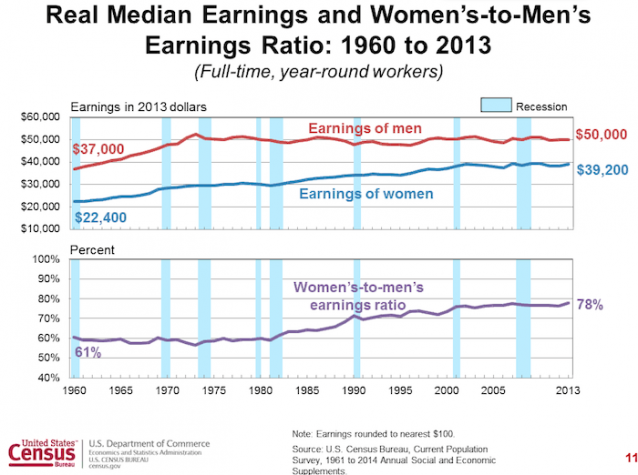 That button there on the right belonged to my mother. She was an ardent feminist and, in fact, took me to my very first political protest when I was in high school; an 85,000-person strong march in Chicago in 1980 demanding passage of the Equal Rights Amendment. 59¢ cents was how much women made for the same job a man was paid a dollar to do.
That button there on the right belonged to my mother. She was an ardent feminist and, in fact, took me to my very first political protest when I was in high school; an 85,000-person strong march in Chicago in 1980 demanding passage of the Equal Rights Amendment. 59¢ cents was how much women made for the same job a man was paid a dollar to do.
In the 35 years since then, that number has barely risen and today stands at roughly 77¢ – just 18¢ more than it was in 1980. At that rate – about a half a penny a year – to paraphrase Laurie Anderson, it will be the year 2059 before they make a buck.
Here’s the Census Department’s data showing that progress toward pay equity for women has slowed to a crawl:

If you dig into the actual data, as the American Association of University Women did in a recently-released report titled “The Simple Truth about the Gender Pay Gap“, certain women have it even worse than that. Here’s are some highlights lowlights of what they found:
- The pay gap has barely budged in a decade.
- Women in every state experience the pay gap, but some states are worse than others.
- The pay gap is worse for women of color.
- Women face a pay gap in nearly every occupation.
- The pay gap grows with age.
- While more education is an effective tool for increasing earnings, it is not an effective tool against the gender pay gap.
- The pay gap also exists among women without children.
Earlier this week, Amy wrote about a package of bills introduced into the state House by the Michigan Progressive Women’s Legislative Caucus to stop wage discrimination in our state. That same day, Democrats introduced a resolution establishing April 14th as “Pay Equity Day” in Michigan. This is not the first time this has been done. In fact they’ve been introducing this resolution since 2011. However, this year, Republicans took the step of stripping out the factual data explaining the need for the resolution.
This is the resolution that was passed last year (which is essentially identical to the one passed in 2013):
House Resolution No. 337.
A resolution to declare April 8, 2014, as Pay Equity Day in the state of Michigan.Whereas, Nearly 50 years after the passage of the Equal Pay Act and Title VII of the Civil Rights Act, women and people of color continue to suffer the consequences of inequitable pay differentials; and
Whereas, According to statistics released in 2011 by the U.S. Census Bureau, year-round, full-time working women in 2010 earned only 77 percent of the earnings of year-round, full-time working men nationally and 74 percent in the state of Michigan, indicating little change or progress in pay equity; and
Whereas, Higher education is not free from wage discrimination. According to a U.S. Department of Education analysis, after controlling for rank, age, credentials, field of study, and other factors, full-time female faculty members earn nearly 9 percent less than their male counterparts; and
Whereas, According to statistics released in 2011 by the U.S. Census Bureau, Michigan women earned only $36,931 compared to men making $50,053. Looking at year-round, full-time college educated workers, Michigan women earned 74 percent of the earnings of their male counterparts, with Michigan ranking 45th in the nation; and
Whereas, Over a working lifetime, this wage disparity costs the average American woman and her family $700,000 to $2 million in lost wages, impacting Social Security benefits and pensions; and
Whereas, Fair pay equity policies can be implemented simply and without undue costs or hardship in both the public and private sectors; and
Whereas, Fair pay strengthens the security of families today and eases future retirement costs, while enhancing the American economy; and
Whereas, April 8, 2014, symbolizes the time in the new year in which the wages paid to American women catch up to the wages paid to men from the previous year; now, therefore, be it
Resolved by the House of Representatives, That the members of this legislative body declare April 8, 2014, as Pay Equity Day in the state of Michigan. We urge Michigan’s citizens to recognize the full value of women’s skills and significant contributions to the labor force and encourage businesses to conduct an internal pay evaluation to ensure women are being paid fairly.
Here is the resolution passed on Tuesday morning:
Substitute for House Resolution No. 51.
A resolution to declare April 14, 2015, as Pay Equity Day in the state of Michigan.Whereas, It has been 52 years since the passage of the Equal Pay Act, and even with the passage of Title VII of the Civil Rights Act just one year later, women and people of color continue to suffer the consequences of inequitable pay differentials; and
Whereas, Over a working lifetime, wage disparity costs the average American woman and her family, impacting Social Security benefits and pensions; and
Whereas, pay discrimination based on any factor is wrong, employees should be compensated by their employers based solely on their merits; and
Whereas, Fair pay strengthens the security of families today and eases future retirement costs while enhancing the American economy; and now, therefore, be it
Resolved by the House of Representatives, That the members of this legislative body declare April 14, 2015, as Pay Equity Day in the state of Michigan. We urge Michigan’s citizens to recognize the full value of women’s skills and significant contributions to the labor force.
They even stripped out language that explains why April 14th is called “Pay Equity Day” in the first place – it represents the extra amount of days women had to work on top of all the days they worked in 2014 in order to earn the same as a man in the same job.
Why did they do this? Because Republicans didn’t want to have a debate over the facts presented in the original version of the resolution:
House Speaker Kevin Cotter, R-Mt. Pleasant, said factual assertions in the original resolution would have required vetting in committee. He noted that Democrats wanted action on the measure that same day.“We have two types of resolutions, commemorative resolutions and policy resolutions, and for good reason, policy resolutions go through the committee process,” said Cotter.
Cotter’s claim that these facts which are widely accepted as true had to be debated ignores the fact that the House didn’t have that debate last year or the year before. But, as most of us are well-aware, this new legislature is far more dominated by conservative extremists than the last legislature (which is saying a LOT) and this sort of thing is only the beginning of what we’ll be living with for at least the next two years.
Democrat Kristy Pagan who introduced the resolution that was eventually gutted said she believes that the resolution is weakened by the elimination of the factual assertions. “I think it weakens it,” Pagan told MLive. “I think it buries the details about how important this issue is to the women of Michigan, to Michigan’s families and it takes away the really jaw-dropping statistic of how big the wage gap is here in Michigan.”
If you think that the state House under Jase Bolger was bad – and he had female legislators barred from the House floor for uttering the word “vagina” – you ain’t seen nothing yet. We have a very, very long and rough road ahead of us for at least the next two years.
UPDATE:Rep. Pagan is now calling for a House hearing on the gender-based wage gap:
Trying to hide that there is a serious wage gap issue for women by erasing the facts is not going to make the problem go away. Millions of women and their families in Michigan take a hit in their paychecks every day by the wage gap and this is not going away just because republicans want to silence their stories. Rather than trying to ignore the facts, I am calling on Speaker Cotter to hold a legislative hearing to examine pay inequity statistics and hear firsthand accounts from women who are affected by the pay gap.



